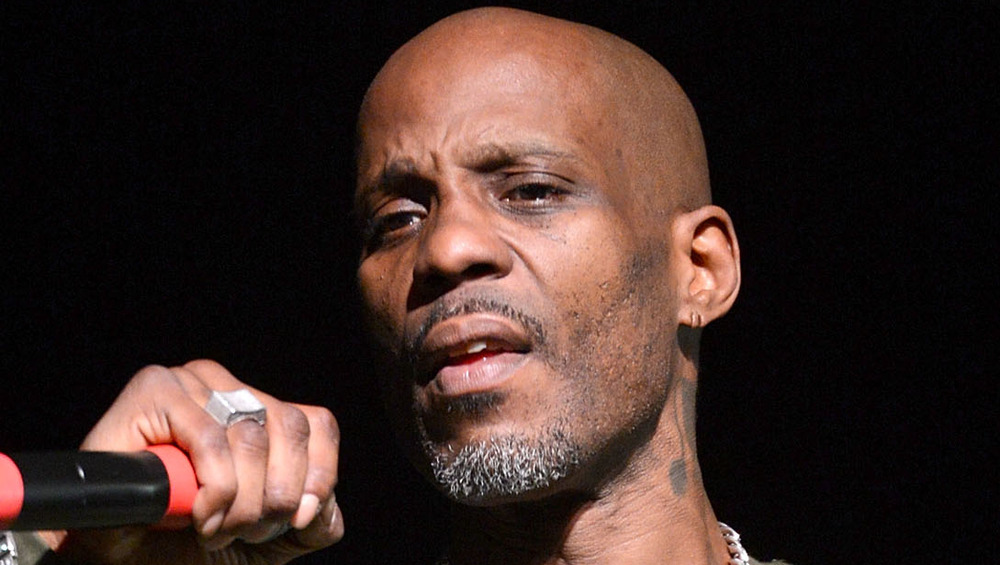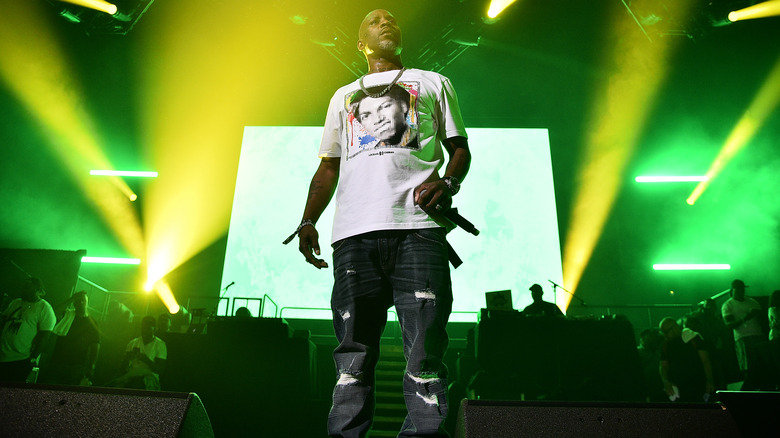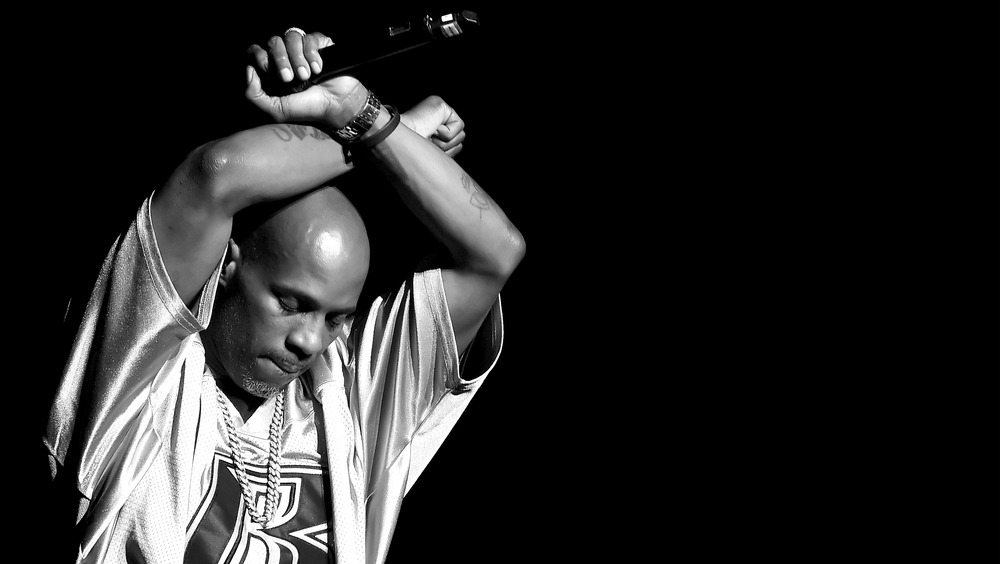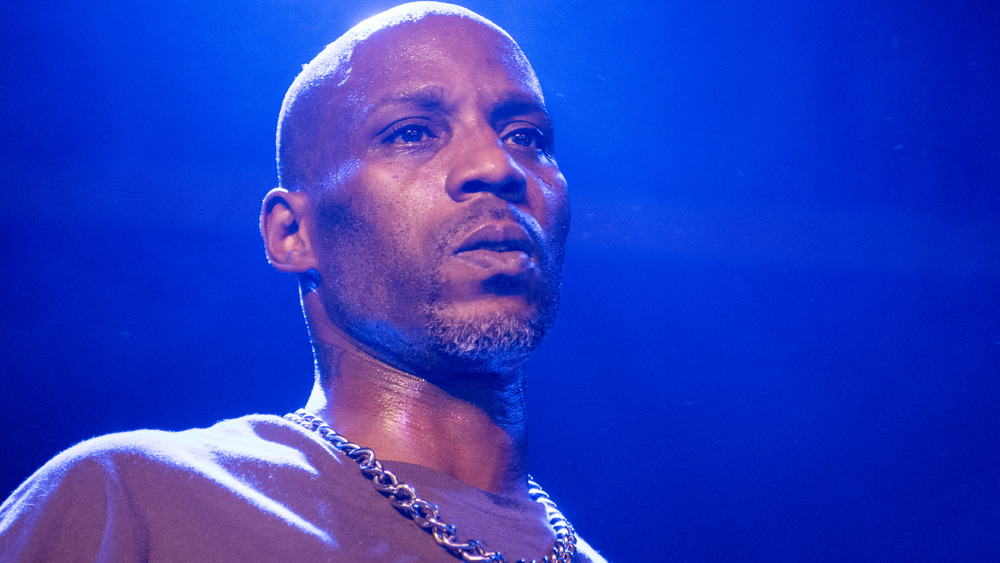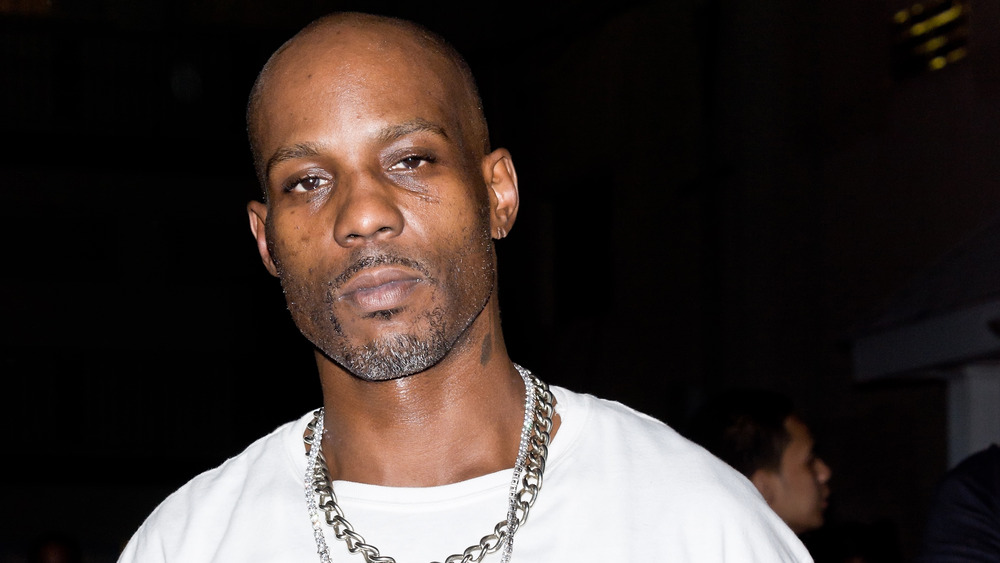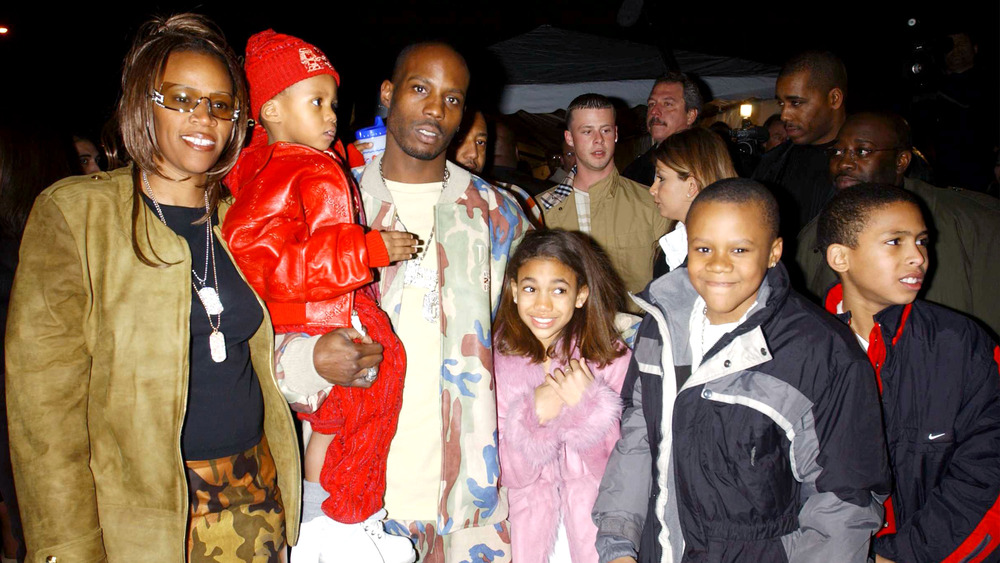DMX's Cause Of Death Explained
DMX, who had been in the hospital for nearly a week, has died, according to a statement his family provided to People. "We are deeply saddened to announce today that our loved one, DMX, birth name of Earl Simmons, passed away at 50 years old at White Plains Hospital with his family by his side after being placed on life support for the past few days," they wrote.
DMX was rushed to White Plains Hospital in New York a week ago, after suffering a heart attack (via NBC News). The 50-year old rapper remained in the hospital's intensive care unit on life support for a week. His former manager Nakia Walker told BuzzFeed News that he was "in a vegetative state, [with] lung and brain failure and no brain activity."
At around 11 p.m. on April 2, first responders were called to the home of the hip-hop legend. TMZ reported that paramedics attempted to resuscitate DMX for some 30 minutes. Prior to his death, updates on the rapper's health failed to note any changes in his condition. Hundreds of fans and supporters gathered outside White Plains Hospital for a prayer vigil and rally held in support of the New York native in the days that followed (via Fox News).
What actually caused DMX's death?
Initially, reports circulated that DMX's death was in part due to the amount of time that passed between the arrival of paramedics and the star's admission to a hospital. However, information from the Westchester County medical examiner's office later surfaced, revealing that Earl Simmons' death was caused not by lack of oxygen to his brain, but by lack of blood flow.
A source inside the medical examiner's office told Vulture that DMX suffered a cocaine-induced heart attack. "It was cardiac arrest for a period of time, so there was no circulation to the brain," the source revealed. This blocked blood flow to the brain ultimately led to brain death.
Although brain death is often confused with a coma, Johns Hopkins Medicine explains that they are very different things. A person may wake up from a coma, but brain death is defined as the irreversible shutdown of all brain function, including that of the brainstem. The brainstem controls involuntary functions like breathing and heartbeat (via Encyclopedia Britannica) and the loss of its function almost always signals a loss of life.
DMX's journey to sobriety had been a bumpy road
DMX first came on the music scene in the '90s releasing hit songs like "Party Up (Up In Here)" and "Get at Me Dog" (via NPR). His musical career has garnered him three Grammy nominations as well as in 2003 becoming the first artist to have his first five albums enter the Billboard charts at No. 1. In addition to his great musical career, DMX has also starred in numerous movies and TV shows, including "Romeo Must Die" and "Never Die Alone."
While DMX has seen an impressive career to date, it has not been without some turbulence. The legend has been very open about his past struggles with drug addiction and multiple stints in rehab. Most recently in 2019 after spending one year in prison for tax fraud, DMX cancelled multiple concerts to receive help in rehab stating his "ongoing commitment to putting family and sobriety first" (via Rolling Stone).
DMX opened up about how he initially became addicted to drugs
In a very open and vulnerable interview with Talib Kweli for UPROXX in 2020, DMX opened up about how he became addicted to crack at the age of 14. Becoming tearful in the interview, DMX described how his then-mentor — who was 30 years old — would go on to change the course of his life forever. Of his mentor, who remained unnamed, DMX said, "He introduced me to what would be the best part of my life — the rap." He went on to say, "He also introduced me to a curse — crack." He described how at 14 years old, he was unknowingly given a blunt "laced with crack," and from then on "the monster was born."
Despite struggling with drug addiction for years, DMX went on to say that "drugs were a symptom of a bigger problem." He spoke about how taking care of his mental health was important to his sobriety and well-being.
DMX encouraged people to open up and talk about their problems
While drug addiction has been part of DMX's struggles, it did not come alone. In the UPROXX interview, he opened up about blocking out childhood traumas, but went on to say that there is only so much you can block out "before you run out of space." While initially blocking out traumatic events at a young age may have protected him, later in life he came to realize the importance of "letting stuff out." He said, "I learned I had to deal with things that hurt me, that I didn't deal with when they hurt, when they happened." Once he started dealing with issues from his childhood and onwards, he was able to take better care of himself.
One barrier to getting help sooner was his environment. DMX opened up about how "in the hood" no one wanted to help with talking or listening, because "Talking about your problems is looked at as a sign of weakness, when actually it's one of the bravest things you can do. Put it on the table, chop it up and just let it out." He stressed the importance of talking things out, not bottling them up, and sharing them with the right person. He also emphasized the courage and bravery it takes to open up about your struggles in the first place — something relatable to millions of people around the world.
DMX's April 2021 hospitalization was not his first
DMX's hospitalization in April 2021 was unfortunately not the first time he needed serious medical attention. In 2016, the then-45-year-old collapsed in a hotel parking lot and was found unresponsive and without a pulse (via Fox News). After initially receiving CPR by cops who arrived on the scene, a medic injected DMX with Narcan, the anti-opioid medication saving thousands of people from drug overdoses. He was rushed to the hospital and thankfully survived.
Oftentimes, people believe that drug addiction and overdoses only affect celebrities, but the United States has been battling a drug epidemic for years. Addiction does not care whether you are rich or poor, famous or an average Joe, happy or sad. According to the Centers for Disease Control and Prevention (CDC), in 2018 over 67,000 people died from a drug overdose. They also determined that between 2012 and 2018, overdoses due to cocaine and psychostimulants increased by three and five times respectively.
DMX's family rallied around him
While DMX remained in a vegetative state, his friends and family rallied to support and encourage him. It was reported by the New York Post that some of the rapper's 15 children were amongst visitors since his hospitalization. With COVID-19 restrictions still in place, only one visitor was allowed in at a time.
After his death, his family wrote, "Earl was a warrior who fought till the very end. He loved his family with all of his heart and we cherish the times we spent with him. Earl's music inspired countless fans across the world and his iconic legacy will live on forever. We appreciate all of the love and support during this incredibly difficult time. Please respect our privacy as we grieve the loss of our brother, father, uncle and the man the world knew as DMX. We will share information about his memorial service once details are finalized."
If you or anyone you know is struggling with addiction issues, help is available. Visit the Substance Abuse and Mental Health Services Administration website or contact SAMHSA's National Helpline at 1-800-662-HELP (4357).

